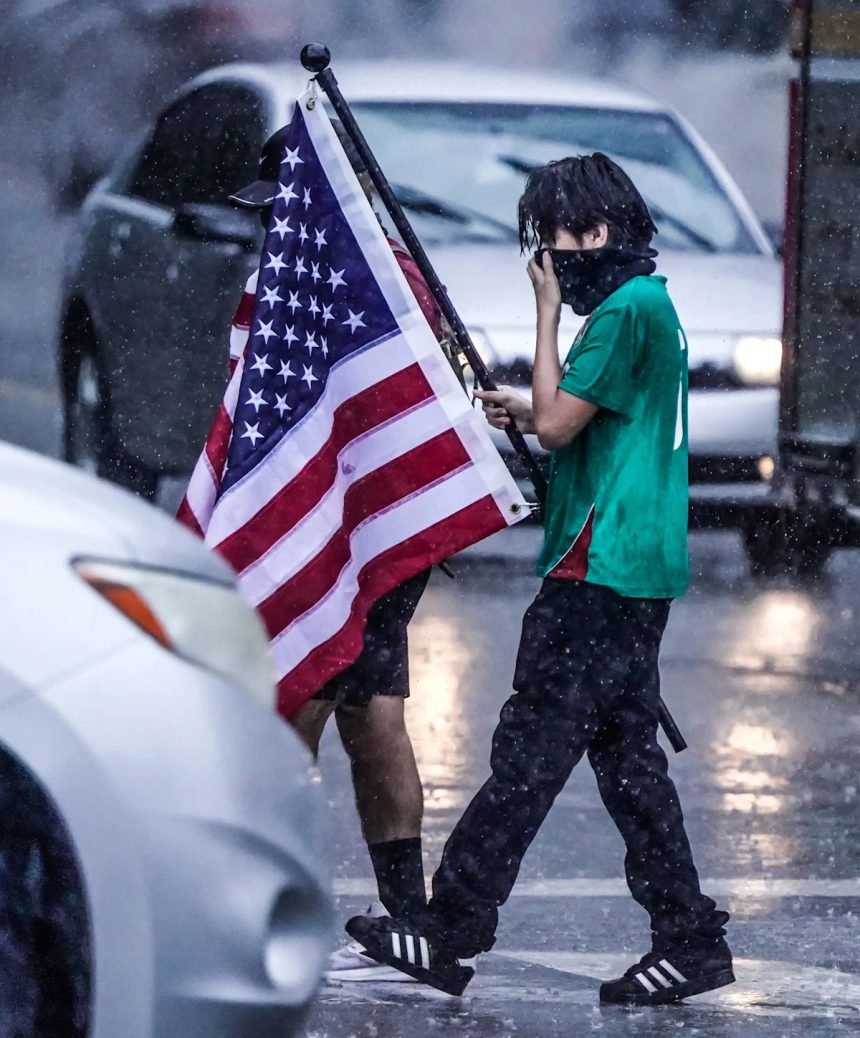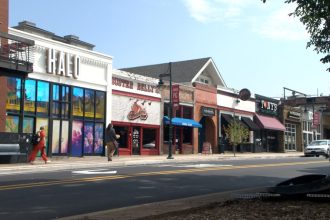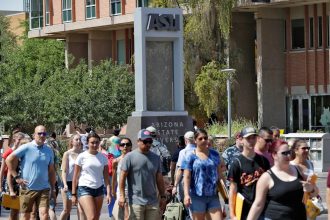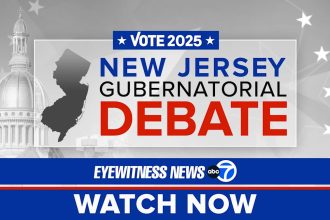The nationwide “No Kings” movement is set to return to the streets of Indiana this Saturday, Oct. 18, in response to recent actions by the Trump administration and the U.S. Customs and Immigration Enforcement.
The demonstrations are scheduled across dozens of Indiana cities, including Indianapolis, Bloomington, Evansville, Fort Wayne, Muncie and South Bend.
For those planning to join the rallies, here’s what you should know about your protected rights and what actions should be avoided.
First Amendment rights: What protesters can and can’t do in Indiana
Protesters are granted certain freedoms under the First Amendment, including the right to:
-
Demonstrate, such as taking part in a rally or march
-
Donate to groups and political candidates
-
Get together with other people to talk about issues
Cynthia Stephens chants in protest as JD Vance meets with lawmakers Friday, Oct. 10, 2025, outside the Indiana State Library in downtown Indianapolis.
These rights come with limitations, however.
Though not exhaustive, here are a few rules Hoosier protesters must follow, according to the ACLU of Indiana.
Where can I protest?
-
Your right to free speech is strongest in public spaces, such as streets, sidewalks and parks.
-
You can typically speak out on other public property, like plazas in front of government buildings, as long as you are not blocking access to the building or interfering with any other purposes of the building.
-
You must receive permission from the owner to protest on private property. The government cannot restrict your speech if you’re protesting on your own private property.
What about counterprotests?
-
Counterprotests should receive the same rights as protests, and the two should be allowed within sight and sound of the other, but antagonistic groups should be separated.

A Donald Trump supporter drives laps around the Indiana Statehouse as protesters chant and march on Saturday, June 14, 2025, during a ‘No Kings’ protest in Indianapolis.
Can I video police and take photographs at a protest?
-
You can photograph anything in plain view, including federal buildings and the police, while protesting on public property.
-
You must get consent from the owner to photograph or film anything on private property.
What happens if I’m stopped or detained for taking photographs?
-
Always remain calm and never physically resist a police officer.
-
Police cannot detain you without reasonable suspicion that you have or are about to commit a crime or are in the process of doing so.
-
If you are stopped, ask the officer if you are free to leave. If the answer is yes, calmly walk away.
-
If you are detained, ask the officer what crime you are suspected of committing, and remind the officer that taking photographs is your right under the First Amendment and does not constitute reasonable suspicion of criminal activity.
Story continues after photo gallery.
Do I need a permit?
-
You don’t need a permit to march on sidewalks or streets, as long as you are not blocking pedestrian or car traffic.
-
Marches or parades that require blocking traffic or street closures, large rallies requiring the use of sound amplifying devices or rallies over a certain size may require permits.
-
Permits cannot be denied because the event is controversial, filing procedures weren’t followed in time before a breaking news event or the application fee was too high.
Story continues after photo gallery.
Things you can’t do during a protest
-
You cannot disrupt public order or harm others while protesting.
-
You cannot incite imminent violence or crime while protesting.
Can police disperse protests?
Yes, police can shut down a protest through a dispersal order, according to the ACLU of Indiana, but it must be used as a last resort in the following situations:
-
When there’s a clear and present danger of riot
-
Disorder or interference with traffic
-
Other immediate threats to public safety.
If officers choose to do so, they must provide protesters a reasonable opportunity to comply with the order, including sufficient time and a clear, unobstructed exit path, ACLU says.
Police should give demonstrators clear instructions concerning the dispersal order before they are arrested or charged with any crime, according to ACLU.
This includes how much time demonstrators have to disperse, the consequences of failing to do so, and a clear exit route they can follow.

Protesters chant and march on Saturday, June 14, 2025, during a ‘No Kings’ protest at the Indiana Statehouse in Indianapolis.
What to do if you believe your rights have been violated
The ACLU of Indiana suggests the following:
-
Write down everything you remember when you can, including the officers’ badge and patrol car numbers and the agency they work for.
-
Get contact information for witnesses.
-
Take photographs of any injuries.
-
File a written complaint with the agency’s internal affairs division or civilian complaint board.
What to do at a protest if you are stopped by police
-
Stay calm with your hands visible and point out that your actions are protected under the First Amendment.
-
Ask if you are free to leave.
-
If you are under arrest, ask why and request a lawyer.
-
You have the right to make three phone calls.
-
You do not have to consent to a search of yourself or your belongings, though police may “pat down” your clothing if they suspect you have a weapon.
-
Police officers may not confiscate or demand to view your photographs or video without a warrant, nor may they delete any data.
What are ‘No Kings’ protests?
The protest’s organizer, Indivisible, originally planned the June 14 demonstration as a “nationwide day of defiance” in response to the $40 million military parade President Donald Trump orchestrated on his birthday.
The movement preaches the idea that “America has No Kings,” and says, “Now, President Trump has doubled down,” referencing the recent actions of U.S. Immigration and Customs Enforcement (ICE) officers, healthcare cuts and more.
“The president thinks his rule is absolute,” the site says. “But in America, we don’t have kings and we won’t back down against chaos, corruption and cruelty.”
When and where are ‘No Kings’ protests in Indiana? ‘No Kings’ protests near me
The times and addresses of the Oct. 18 protests scheduled in Indiana can be found below. Events without addresses have private locations, and more details can be found after signing up on the “No Kings” website.
-
Indianapolis: 11 a.m.-2 p.m. ET, @ Indiana Statehouse
-
Indianapolis: Noon-3 p.m. ET, @ Indiana Statehouse
-
Albion: 11 a.m.-Noon ET, @ 100 N Orange St
-
Anderson: 11:30 a.m.-1 p.m. ET, @ Madison County Courthouse
-
Angola: 11 a.m.-1p.m. ET, @ South Public Square
-
Auburn: Noon-2 p.m. ET, @ 100 Main St
-
Bedford: Noon-2 p.m. ET, @ Bedford Courthouse Square
-
Bloomington: 2-4:30 p.m. ET, @ Courthouse Square
-
Brookville: 10 a.m.-Noon ET, @ In Front of the Franklin County Courthouse
-
Columbus: 11 a.m.-Noon ET, @ Columbus City Hall
-
Corydon: 11:30 a.m.-1:30 p.m. ET, @ Corydon Town Square
-
Crown Point: Noon-2 p.m. CT, @ Crown Point Courthouse Square
-
Decatur: Noon-3 p.m. ET, @ Adams County Courthouse
-
Delphi: 3-5 p.m. ET, @ Carroll County Courthouse – Side Walk
-
Evansville: 10:30 a.m.-Noon CT, @ EVPL McCollough
-
Fort Wayne: 2-5 p.m. ET, @ Allen County Court Administration
-
Frankfort: 2-4 p.m. ET, @ 1 S. Maish Rd
-
Greencastle: Noon-2 p.m. ET, @ Putnam County Courthouse
-
Kokomo: Noon-3:30 p.m. ET, @ Howard County Courthouse
-
Lagrange: Noon-2 p.m. ET, @ 105 N Detroit St
-
Lebanon: Noon-2 p.m.. ET, @ Courthouse Sq.
-
Liberty: 10 a.m.-Noon ET, @ Union County Courthouse
-
Logansport: Noon-2 p.m. ET, @ In front of Big Lots, 2525 E Market St.
-
Madison: 10 a.m.-noon ET, @ Jaycee Park / Madison Milton Bridge View Parking
-
Marion: Noon-2 p.m. ET, @ Grant County Court House
-
Muncie: Noon-2 p.m. ET, @ Fallen Heroes Memorial Bridge
-
Nashville: 11 a.m.-1 p.m. ET, Private Event
-
New Albany: 11 a.m.-12:30 p.m. ET, @ New Albany City Hall sidewalk
-
Plainfield: 1-3 p.m. ET, @ Corner of Main St & Mills St
-
Richmond: 2-3:30 p.m. ET, @ Jack Elstro Plaza
-
South Bend: Noon-1:30 p.m. ET, @ 211 N Michigan St
-
Terre Haute: Noon-2 p.m. ET, @ Vigo County Courthouse
-
Vincennes: 1-3 p.m. ET, @ Knox County Courthouse
-
Warsaw: 2:30-4:30 p.m. ET, @ Corner of Center and Detroit Streets
-
Warsaw: 2:30-6:30 p.m. ET, @ Warsaw Community Public Library
-
West Lafayette: 2-5 p.m. ET, @ Margerum Fountain and John T Myers Pedestrian Bridge
John Tufts covers trending news for IndyStar and Midwest Connect. Send him a news tip at JTufts@Gannett.com. Find him on BlueSky at JohnWritesStuff.
This article originally appeared on Indianapolis Star: ‘No Kings’ rallies return to Indiana Oct. 18. Where you can protest









